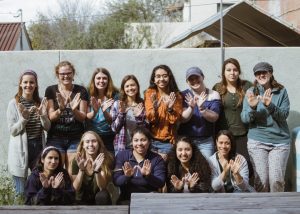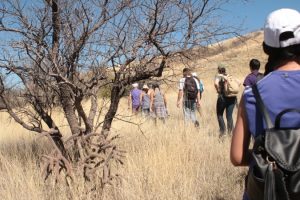Reflection by Samm Sposito & Jessica Del Haro
This past week has been one of the most profound experiences of my life. The people, the sights, the experiences will be something that will forever be encased in my brain, soul, and heart. Coming on this immersion, I did not know what to expect. However, coming with a blank slate, open mind and open heart allowed me to gain knowledge without biases and truly from the source. Especially today as we talked about how the border wall not only divides cultures and peoples but the additional victims of this tragedy are the ones that are overlooked: nature. Nature knows no boundaries. Rivers flow wherever they please. Plants grow wherever there is a source of food. Birds do not speak English nor Spanish. The main takeaway of these examples is that nature does not understand boundaries. However, the victims of the militarization of the border walls are not only people fleeing persecution, war, abuse, crime but animals in search of their next meal and survival. This is the story people fail to bring light to as more barriers continue to rise, animals are victims as they are prevented from migrating to areas that they once had access to.
In an attempt to summarize the amazing, impactful events and stories that we heard this week, I just wanted to share one thing I think is important to note. With issues such as immigration and everything concerning it, it is impossible for one person to take it upon themselves to solve these problems alone. As long as you put all your effort and strength into something impactful no matter how big or small, you need to realize that what you are doing is amazing. There is not One who will save us, but there are Ones who can. It is easy to fall into the trap of trying to solve so many issue at once, but what we all need to realize is that any contribution we make can be the difference in someone’s life.
Sergio from The Sierra Club organization was so full of love and appreciation for animals and nature. He also spoke extensively about the human condition and the importance of listening to all different kinds of experiences from different people, and the importance of representation and diversity in activism and leadership positions. This was a perfect conversation to have on today on International Women’s Day. Being an all female immersion, I felt that this day was especially meaningful and impactful. Our group has had many opportunities all week to be vulnerable with one another and really show up in terms of the activities we had planned, and I think being an all female immersion allowed for that aspect to be easier to reach and bond with one another. We celebrated today by taking pictures as a group and having a final reflection ceremony that was emotional and beautiful. I couldn’t have asked for a more powerful and incredible week in Arizona with these incredible people.
Organizations: Sierra Club Border, Sanctuary Coalition

 Reflection by Selene Andrade Bernal & Meghan Childs
Reflection by Selene Andrade Bernal & Meghan Childs